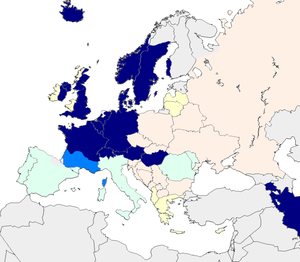Pro-drop language
Pro-drop language (from English pro-drop short for pronoun dropping , "leaving out a pronoun") or null subject language refers to languages in linguistics in which personal pronouns , especially as subject of finite sentences, do not have to be set systematically. The Generative Grammar explains this omission as the filling of the subject position by an invisible ( "phonetically empty") pronoun and refers to this as "pro" (always in lower case; it is in this theory, in contrast to the (always capitalized) "PRO" as the invisible Subject of infinitive clauses).
Examples
In the Romance languages
In most of the Romance languages ( Romania ) - however, e.g. B. French is excluded - a pronoun in the subject position is usually not implemented. However, many northern Italian dialects are also excluded from this, including the Venetian and all Rhaeto-Romanic idioms such as Friulian , Ladin or Graubünden Romance .
Spanisch: Lo veo es seh-1SG = 'Ich sehe es'
Italienisch: Lo conosco ihn kenn-1SG = 'Ich kenne ihn'
Lateinisch: me amat mich liebt-3SG = 'Er, sie oder es liebt mich'
As can already be assumed from the German translation, the current Germanic languages, on the other hand, are not pro-drop languages: the subject position usually has to be filled (in this case by me ). Exceptions are in German sentences in the impersonal passive voice (“because there is work”), where there is no filling pronoun; Furthermore, they occur in colloquial language and in the telegram style , but only in the first and second person singular (but then the closing "-e" cannot be omitted in the first person as is often the case): "I'm out of town by the end of the week" "Hello, I'll be arriving at the airport tomorrow morning at 8 o'clock". (In an exceptional case, if it is used to avoid an "I" at the beginning of the letter, this also occurs in the commercial language.)
The Romance languages can “allow themselves” to be pro-drop languages because the inflection morphology of the verb, which is obligatorily inflected for person and number , allows conclusions to be drawn about the subject. However, as can also be seen from the example of German, there is no necessary correlation between the morphological type of a language and its behavior with regard to the realization of pronouns: In German, the verb inflects for the same categories as Spanish , but German is not a pro -Drop language. Recently, however, the term semi-pro-drop languages has been used more frequently:
Deutsch: dass [pro] gelacht wurde (inhaltsloses Subjekt wird ausgelassen)
In principle, it can be said that a language that has a particularly rich inflectional morphology of the verb tends to be a pro-drop language. As mentioned above, this is the case in many Romance languages. In French, for example, the finals fell silent quite early on, which is why four of the six forms of the verb parler 'speak' sound the same today, namely [parlə]. As a result, the initially non-obligatory subject pronouns were used to differentiate the people, which made a distinction possible again. On the other hand, there are also Romance languages and dialects which, despite pronounced verbal inflection, use obligatory subject pronouns, even if a nominal subject is mentioned, compare Friulian il pari al cjante , the father (he) sings' or many other Italian dialects. In contrast to the pro-drop languages, there is a threefold subject marking by the noun, the pronoun and the inflectional ending.
In the Slavic languages
Most of the Slavic languages - which are still the most conservative of the Indo-European languages in terms of breaking down inflectional morphology - are also pro-drop languages. Here are some examples:
Tschechisch: Jsem student bin-1SG Student = 'Ich bin Student'
Slowenisch: Bom delal werde-1SG gearbeitet = 'Ich werde arbeiten'
Concept history
The term comes from generative grammar . The so-called pro-drop parameter or null subject parameter is one of the parameters proposed in the principles-and-parameter theory for universal grammar .
literature
- Osvaldo Jaeggli & Ken Safir (Eds.): The Null Subject Parameter. Kluwer, Dordrecht 1989
- Nina Hyams (Ed.): Language Acquisition and the Theory of Parameters. Dordrecht 1986
- Wilko Lücht: Latin as a pro-drop language. The use of subject pronouns in Roman comedy from a language typological and empirical point of view. In: Glotta 87 (2011), pp. 126–154
- Gereon Müller: Pro-Drop and Impoverishment. University of Leipzig 2005.
- Natascha Müller; Beate Riemer: Generative syntax of the Romance languages: French, Italian, Portuguese, Spanish. Stauffenburg, Tübingen 1998, ISBN 3-8605-7274-1 .
Web links
- Rolf Kailuweit: Pro-drop ", Congruence and" Optimal "Klitika. A description approach within the framework of the" ROLE AND REFERENCE GRAMMAR ". In Carmen Kelling, Judith Meinschaefer, Katrin Mutz: Morphology and Romance Linguistics. Files of the section of the same name at XXIX German Romance Day, Saarbrücken 2005 (PDF)
- Irene Doval: On the question of the grammaticalization of impersonal constructions in German. Revista de Filología Alemana 2011, vol. 19 225-246 ISSN 1133-0406
Individual evidence
- ^ Metzler Lexicon of Language. 2nd edition, 2000, keywords zero-subject parameters, pro-drop parameters, semi-pro-drop languages
